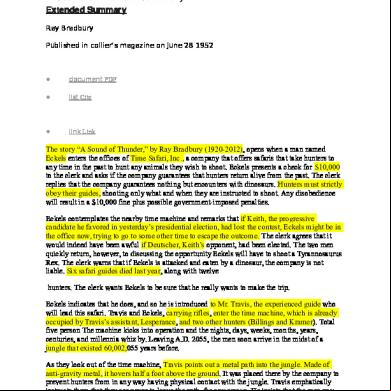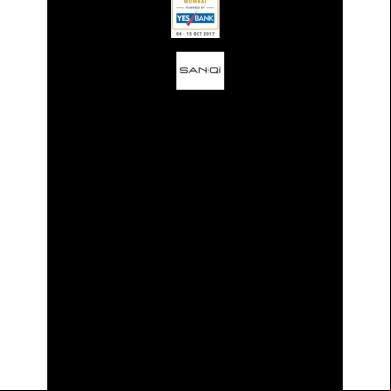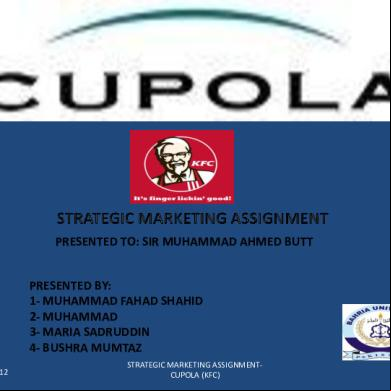A Sound Of Thunder Summary 4m1o4f
This document was ed by and they confirmed that they have the permission to share it. If you are author or own the copyright of this book, please report to us by using this report form. Report 3zb22
Overview 124f1p
& View A Sound Of Thunder Summary as PDF for free.
More details 2x4n45
- Words: 976
- Pages: 3
A Sound of Thunder Summary Extended Summary Ray Bradbury Published in collier’s magazine on june 28 1952
document PDF
list Cite
link Link
The story “A Sound of Thunder,” by Ray Bradbury (1920-2012), opens when a man named Eckels enters the offices of Time Safari, Inc., a company that offers safaris that take hunters to any time in the past to hunt any animals they wish to shoot. Eckels presents a check for $10,000 to the clerk and asks if the company guarantees that hunters return alive from the past. The clerk replies that the company guarantees nothing but encounters with dinosaurs. Hunters must strictly obey their guides, shooting only what and when they are instructed to shoot. Any disobedience will result in a $10,000 fine plus possible government-imposed penalties. Eckels contemplates the nearby time machine and remarks that if Keith, the progressive candidate he favored in yesterday’s presidential election, had lost the contest, Eckels might be in the office now, trying to go to some other time to escape the outcome. The clerk agrees that it would indeed have been awful if Deutscher, Keith’s opponent, had been elected. The two men quickly return, however, to discussing the opportunity Eckels will have to shoot a Tyrannosaurus Rex. The clerk warns that if Eckels is attacked and eaten by a dinosaur, the company is not liable. Six safari guides died last year, along with twelve hunters. The clerk wants Eckels to be sure that he really wants to make the trip. Eckels indicates that he does, and so he is introduced to Mr. Travis, the experienced guide who will lead this safari. Travis and Eckels, carrying rifles, enter the time machine, which is already occupied by Travis’s assistant, Lesperance, and two other hunters (Billings and Kramer). Total five person The machine kicks into operation and the nights, days, weeks, months, years, centuries, and millennia whiz by. Leaving A.D. 2055, the men soon arrive in the midst of a jungle that existed 60,002,055 years before. As they look out of the time machine, Travis points out a metal path into the jungle. Made of anti-gravity metal, it hovers half a foot above the ground. It was placed there by the company to prevent hunters from in any way having physical with the jungle. Travis emphatically instructs them that they are never to leave the path, for any reason. He insists that the men pay
careful attention to this rule and never violate it. They are not to touch anything, and they are not to shoot at any animals unless Travis approves. When Eckels asks why, Travis elaborately explains that the company does not want to take any chances by changing anything at all about the future. Destroying even a flower, an insect, a mouse, or any other living thing could cause potentially massive unforeseen consequences in the future. This is especially the case since killing one living thing in the jungle would mean wiping out the potential offspring of that thing, and thus the offsprings’ offspring, and so on and on and on for countless generations. The results of killing anything in the jungle are literally unpredictable, which is one reason that all the men are wearing oxygen helmets—so as not to introduce any latter-day bacteria into the primeval... (The entire section is 1264 words.)
sixty million, two thousand and fifty-five years When Eckels asks why, Travis launches into an explanation of how changing the past could have a negative effect on the future: If one mouse is killed in the past, the families of that mouse will also no longer live, compounding until the effect of the death of that one mouse could mean generations of people may no longer be alive in the present. With everyone sufficiently scared, they head out.
His story helps us to see the importance of protecting the natural environment, which is an important issue in today's world.
idea of "the ripple effect," where even the minutest events in the past can have drastic repercussions for the future. Bradbury's discussion of the ripple effect forces the reader to consider his or her own place in the world and their responsibilities for future generations. The reader must ask the questions, "How are my actions affecting the people who will come after me? Am I leaving the world a better place for them?" as he tries to explain the necessity of staying on the designated path
damon knight , founder of science fiction, although the term science fiction was not used until about 1930, science fiction, one of the earliest science fiction writers was Lucian of Samosata who, around 100 bc , wrote a fantasy about a journey to the moon, modern fiction took proper shape in 19 century impact of science and technology, sometimes it is real or entirely imagined.,disaster if science fiction is abused. “who controls the past controls the future” George orwell i.insignificant actions can change the future for an entire generation. ii.even tiny changes in past can change drastically alter the future. Deutscher dictatorship –disaster To travel in time, as William balke wrote in auguries of innocence would be Hold infinity in the palm of your hand And eternity in an hour Paul expressed it “time travel is the ultimate fantasy ,the scientific addition to the human quest for immortality.” Time fantasy has strong appeal, as old saying “time is money.” Means it would be wonderful if you could save time just like money. Butterfly fragility of life, opportunity of freedom that eckles destroyed “”embedded in the mud, glistening green and gold and black, was a butterfly, very beautiful and very dead. , sound of thunder drastic changes about to occur, the path way of life, gun symbolize death Bullets could represent disturbance in the past of any future materials or biological substance like human air.
document PDF
list Cite
link Link
The story “A Sound of Thunder,” by Ray Bradbury (1920-2012), opens when a man named Eckels enters the offices of Time Safari, Inc., a company that offers safaris that take hunters to any time in the past to hunt any animals they wish to shoot. Eckels presents a check for $10,000 to the clerk and asks if the company guarantees that hunters return alive from the past. The clerk replies that the company guarantees nothing but encounters with dinosaurs. Hunters must strictly obey their guides, shooting only what and when they are instructed to shoot. Any disobedience will result in a $10,000 fine plus possible government-imposed penalties. Eckels contemplates the nearby time machine and remarks that if Keith, the progressive candidate he favored in yesterday’s presidential election, had lost the contest, Eckels might be in the office now, trying to go to some other time to escape the outcome. The clerk agrees that it would indeed have been awful if Deutscher, Keith’s opponent, had been elected. The two men quickly return, however, to discussing the opportunity Eckels will have to shoot a Tyrannosaurus Rex. The clerk warns that if Eckels is attacked and eaten by a dinosaur, the company is not liable. Six safari guides died last year, along with twelve hunters. The clerk wants Eckels to be sure that he really wants to make the trip. Eckels indicates that he does, and so he is introduced to Mr. Travis, the experienced guide who will lead this safari. Travis and Eckels, carrying rifles, enter the time machine, which is already occupied by Travis’s assistant, Lesperance, and two other hunters (Billings and Kramer). Total five person The machine kicks into operation and the nights, days, weeks, months, years, centuries, and millennia whiz by. Leaving A.D. 2055, the men soon arrive in the midst of a jungle that existed 60,002,055 years before. As they look out of the time machine, Travis points out a metal path into the jungle. Made of anti-gravity metal, it hovers half a foot above the ground. It was placed there by the company to prevent hunters from in any way having physical with the jungle. Travis emphatically instructs them that they are never to leave the path, for any reason. He insists that the men pay
careful attention to this rule and never violate it. They are not to touch anything, and they are not to shoot at any animals unless Travis approves. When Eckels asks why, Travis elaborately explains that the company does not want to take any chances by changing anything at all about the future. Destroying even a flower, an insect, a mouse, or any other living thing could cause potentially massive unforeseen consequences in the future. This is especially the case since killing one living thing in the jungle would mean wiping out the potential offspring of that thing, and thus the offsprings’ offspring, and so on and on and on for countless generations. The results of killing anything in the jungle are literally unpredictable, which is one reason that all the men are wearing oxygen helmets—so as not to introduce any latter-day bacteria into the primeval... (The entire section is 1264 words.)
sixty million, two thousand and fifty-five years When Eckels asks why, Travis launches into an explanation of how changing the past could have a negative effect on the future: If one mouse is killed in the past, the families of that mouse will also no longer live, compounding until the effect of the death of that one mouse could mean generations of people may no longer be alive in the present. With everyone sufficiently scared, they head out.
His story helps us to see the importance of protecting the natural environment, which is an important issue in today's world.
idea of "the ripple effect," where even the minutest events in the past can have drastic repercussions for the future. Bradbury's discussion of the ripple effect forces the reader to consider his or her own place in the world and their responsibilities for future generations. The reader must ask the questions, "How are my actions affecting the people who will come after me? Am I leaving the world a better place for them?" as he tries to explain the necessity of staying on the designated path
damon knight , founder of science fiction, although the term science fiction was not used until about 1930, science fiction, one of the earliest science fiction writers was Lucian of Samosata who, around 100 bc , wrote a fantasy about a journey to the moon, modern fiction took proper shape in 19 century impact of science and technology, sometimes it is real or entirely imagined.,disaster if science fiction is abused. “who controls the past controls the future” George orwell i.insignificant actions can change the future for an entire generation. ii.even tiny changes in past can change drastically alter the future. Deutscher dictatorship –disaster To travel in time, as William balke wrote in auguries of innocence would be Hold infinity in the palm of your hand And eternity in an hour Paul expressed it “time travel is the ultimate fantasy ,the scientific addition to the human quest for immortality.” Time fantasy has strong appeal, as old saying “time is money.” Means it would be wonderful if you could save time just like money. Butterfly fragility of life, opportunity of freedom that eckles destroyed “”embedded in the mud, glistening green and gold and black, was a butterfly, very beautiful and very dead. , sound of thunder drastic changes about to occur, the path way of life, gun symbolize death Bullets could represent disturbance in the past of any future materials or biological substance like human air.










